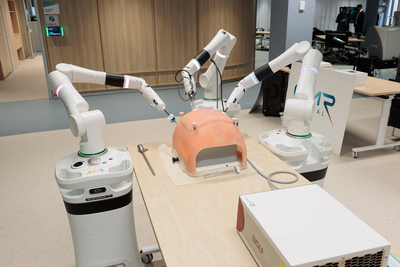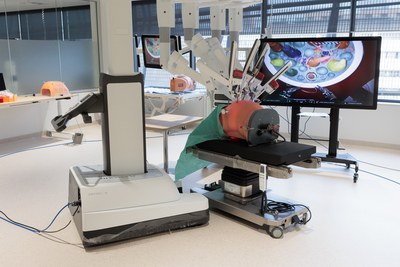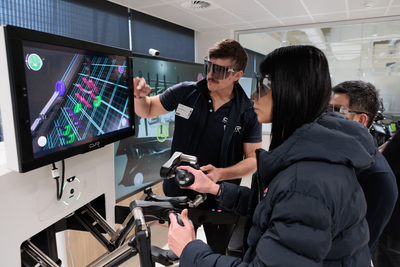Perich Centre for Robotics & Health Technology opens in Liverpool

Home to more than 60 clinician scientists, the purpose-built, 1300 m2 Perich Centre for Robotics & Health Technology has opened in Liverpool in South West Sydney. Ingham Institute for Applied Medical Research launched the centre, which will house Ingham Institute’s clinical research, teaching and advanced training in healthcare automation, housing clinician scientists across allied health, medical, midwifery and nursing specialties.
Among those present at the centre’s opening was David Harris, NSW Minister for Medical Research, who said: “With its focus on collaboration at the cutting edge of health care, Ingham Institute’s new Centre for Robotics and Health Technology, the Perich Centre, will strengthen Ingham Institute’s position as a national and global leader in digital and robotic health care.

“The NSW Government is committed to ensuring access to life-changing innovation for everyone in the state. This new centre will enable researchers to pioneer new technologies to help ensure no matter where people live — including those in disadvantaged and regional, rural and remote communities — they can have the best possible care.”
Dr Glen Schlaphoff, Clinical Lead at the centre, said: “Without ethical engagement, community design and strong clinical leadership, healthcare technologies can widen health gaps, rather than reducing them. At Ingham Institute, ‘tech-quity’ drives everything we do — from early-stage innovation to large-scale adoption — so that automation, robotics and digital tools are built and implemented with equity in mind.”

Ingham Institute works to translate community-focused research into community-focused health benefits, a mission the Perich Centre will seek to advance through a focus on:
- assessing remote diagnostics and intervention — so people can access critical care no matter where they live;
- smarter hospital systems — freeing up time for frontline staff to focus on patients;
- rehabilitation robotics and assistive technology;
- automation — of everything from patient access and care to hospital logistics and service delivery;
- advanced training and education — to prepare the next generation of healthcare workers.
“The considered and correct adoption of automation in health is not just a moral imperative,” said Professor Les Bokey, who handed leadership of the centre’s work to Schlaphoff. “It’s how we create sustainable health systems, improve outcomes across diverse populations, and unlock the full potential of technology for global health impact.”

Projects to be run from the centre include:
- AI and machine learning in cancer, cardiology, neurology and stroke treatment;
- allied health-led rehabilitation robotics and gamified therapy for acquired brain injury;
- diverse application of digital solutions for diabetes prevention, child and adolescent wellbeing, and management of gastrointestinal disease;
- remote sensing and wearable devices in midwifery, nursing and women’s health;
- cost-effectiveness studies of surgical robotics; and
- advanced immersive training environments for future health leaders.
Webinar: Turning data protection into a business advantage
Backup is no longer a safety net, but a strategic tool for risk reduction — and the...
Report explores Australian perceptions of Medtech access
A nationally representative survey conducted from August–September 2025 has explored...
Updated guidance for telehealth and virtual care now available
Reflecting concerns around unethical practice and emerging business models focused more on profit...

![[New Zealand] Transform from Security Awareness to a Security Culture: A Vital Shift for SMB Healthcare — Webinar](https://d1v1e13ebw3o15.cloudfront.net/data/89856/wfmedia_thumb/..jpg)
![[Australia] Transform from Security Awareness to a Security Culture: A Vital Shift for SMB Healthcare — Webinar](https://d1v1e13ebw3o15.cloudfront.net/data/89855/wfmedia_thumb/..jpg)




